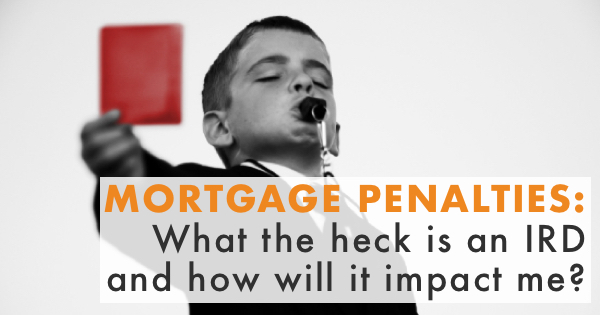If you think mortgage penalties won’t affect you, think again!
The IRD or Interest Rate Differential is a charge levied by lenders. It applies if you pay off your mortgage before it matures. Or, if you pay more on the principal beyond the amount of your prepayment privilege. It other words, it’s a prepayment penalty.
What’s important for you to know is how lenders calculate their IRD penalty, as not all lenders calculate it in the same way. First of all, the IRD is based on:
- The amount you are pre-paying; and,
- An interest rate that equals the difference between your original mortgage interest rate and the interest rate that the lender can charge today if they were to re-lend the funds for the balance of the term of the mortgage.
Mortgage Penalties Explained
Mortgage penalties are standard on “closed” mortgages. “Closed” mortgage interest rates are usually lower than “Open” rates and there are no penalties on “Open” mortgages.
For variable-rate mortgages, on the other hand, the penalty is only three months interest. But for fixed-rate mortgages, the penalty is the greater of three months interest or the Interest Rate Differential (IRD).
Now here’s how the IRD comes into play. When you get a mortgage, you promise to pay a specific interest rate, let’s say 3.5%, for a set number of years, let’s say five years. If you decide to break that arrangement after three years, whether you’re refinancing or purchasing a new home, the lender gets the remaining money back to re-lend. To match the original term, the lender wants to get the same interest rate or more on the remaining two years.
This penalty can be high if interest rates are on a decreasing trend. In that scenario, if you pay out the mortgage early, the lender needs to put the money back on the street as “shorter term” money, matching the remaining term.
Shorter term money comes with a lower interest rate than longer term money. So, the lender calculates how much less interest they will receive over the remaining term at the lower earning rate. This lower rate is called the “reinvestment” rate, compared to your promise of 3.5%. Essentially they are recouping any losses that they would have already budgeted for your mortgage for the balance of the term.
Difference between banks and monoline lenders — it’s in the calculation!
Most non-bank lenders calculate the difference between your original rate and the current rate for the remaining term. This is what we like to refer to as “discounted to discounted”. This differs from the big banks who compare “post to posted”.
It’s important to remember that the big banks’ calculate the IRD differently than the non-bank lenders, and not in your favour. If the original rate was really 4.29% (their posted rate) but they did you a favour and only charged you 3.5%, the IRD would be calculated between 4.29% and the reinvestment rate, (how much less interest they will receive over the remaining term at the lower earning rate) which increases the IRD amount – “posted to discounted”.
Finally, penalties can only be quoted “as of today”. The penalty changes with the following:
- Passing an anniversary date
- Mortgage balance
- Interest rate changes
- Remaining time to maturity
The won’t know the final penalty until there is a formal payout statement requested by you, based on a firm payout date. Bottom line for bank calculations: If interest rates fall, IRD penalties increase.
Now I know what you’re going to say, “I’ll just port my mortgage when I move”, or “I have no need to refinance”. Well, think again. It’s not quite that simple.
By not finding a lender with the lowest possible penalties, you could pay more in the long run. What if you do buy a new home, try to port your mortgage, but the existing lender won’t approve you, or the property? You no longer “fit” their products?
What if you’d wracked up some debt, due to job loss, personal loss etc.? Using some of that hard-earned equity to pay down debt and increase your monthly cash flow would be great. If your penalties are high, this option doesn’t look very attractive. Instead, you’re stuck paying higher interest and struggling to get those consumer debts paid off.
Mortgage penalties are real and inevitable part of having a mortgage. Be prepared!
If you want more information, don’t hesitate to contact me.



Well said, and good to know – thanks Susan!!
You’re most welcome Blair. Thanks for following!